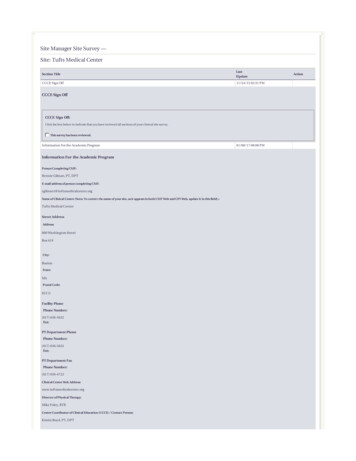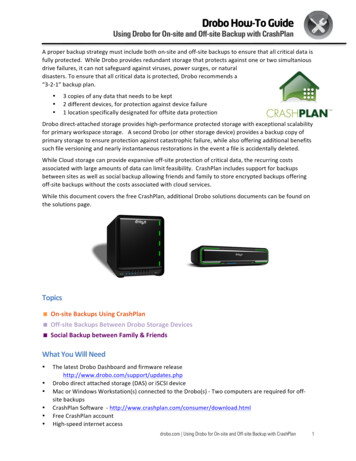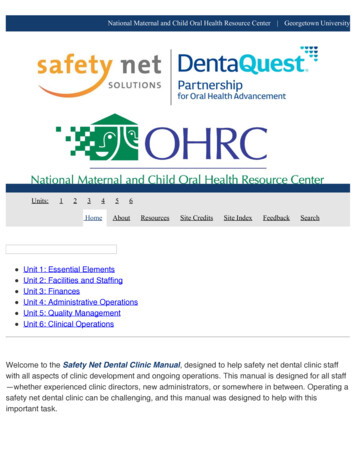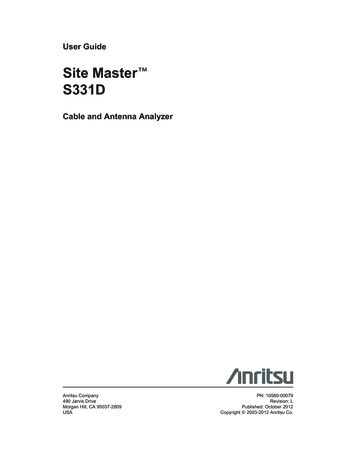
Transcription
INDIVIDUAL/SITESUPERVISORORIENTATION &TRAININGMaster’s ofScience inCounselingEWU
Welcome & Thank YouOn behalf of the faculty and students in the Master’s of Science inCounseling program at EWU thank you for committing to thedevelopment and growth of our practicum and internship students.Your time, expertise, and energy serving as a site/individualsupervisor is very much appreciated.You play a pivotal role in our students’ development as theirdesignated supervisor. Again, thank you. We hope that you are alsoable to benefit and learn from hosting our students!
Rationale The Council for Accreditation of Counseling & Related EducationalPrograms (CACREP) standards require that all on-site and individualsupervisors receive orientation, training, assistance, and consultationregarding the clinical supervision of counseling practicum and internshipstudents. This PowerPoint presentation has been designed to provide basicinformation about clinical supervision and resources related to thesupervision of our students on the school counseling or clinicalmental health counseling specializations. University faculty will contact site supervisors periodically throughout aplacement and provide resources as needed. Please feel free to contactthe university supervisor or internship coordinator at any time with anyquestions or concerns that might arise throughout a placement.The contact information of faculty is provided towards the end of thispresentation.EWU2
How is EWU Different?EWU is a quarter system school and because of that our experiences lookslightly different than semester schools!We start our academic year in late September and end in mid-June.Each quarter is 10 weeks plus a finals week. So the expectations are to befilled within that 11 week time frame.In addition, our students do their practicum at the same site as theirinternship. This means our graduates have at least 700 hours on site whenthey complete the program. This also means they start in late March orearly April and if they take the full year, will be with you until the followingJune! *There is an application for a student to complete internship in twoquarters with your support and permission.
Practicum (100 totalhours)Practicum can best be considered theexperiential bridge between initial academic andcounseling skills training and the application ofthat knowledge and skill in a successfulinternship.The Practicum is completed before internship
Internship (600 total hours)A distinct period of time when a student refines and enhances basiccounseling skills or student developmental knowledge and skills, andintegrates and authenticates professional knowledge and skills related toprogram objectivesThe internship is spread over 3 (school counselors) or 4 (clinical mentalhealth counselors) quarters.
Minimum Hour RequirementsPracticumInternshipDirect Hours40240Indirect Hours60360Site Supervision Per Week11Faculty Supervision Per Week1.51.5Hours on site per week10-1215-20
DirectServiceSupervised use of counseling, consultation, orrelated professional skills with actual clients (can beindividual, couples, families, or groups) for thepurpose of fostering social, cognitive, behavioral,and/or affective change. These activities involveinteraction with others and may include:(1) assessment,(2) counseling,(3) psycho-educational activities and(4) consultation.
What is notConsideredDirectService?The following would not be considered directservice:Observing others providing counseling orrelated servicesRecord KeepingAdministrative dutiesClinical and/or administrative supervision
Group CounselingDuring either practicum or internship, students are required tolead or co-lead a counseling or psychoeducational group for atleast 10 direct service hours
What is Considered Indirect Service?Any activity that does not meet criteria for direct service and is directlyrelated to the student’s professional or academic goals.Qualifies for Indirect ServiceDoes not qualify for indirect serviceCase notes/record keepingBus, lunch or recess dutyWatching training videosChecking in or out clientsPreparing for groupsPersonal tasks for the site supervisorSupervisionCleaningReading charts or student recordsClerical tasks (shredding, filing)
Supervision Requirement of SiteSupervisor:1 hour per Week - Individualsupervision: this may occurin dyadic format twostudents with the supervisor.
FacultySupervisionRequirementsFaculty Supervisor:Each week the faculty supervisor willmeet with students for facultysupervision.15 Hours - Large group supervision issupervised by a program facultymember.
GatekeepingGatekeeping is an important task for both faculty and site supervisors during astudent’s educational journey.“Gatekeeping is the initial and ongoing academic, skill, and dispositionalassessment of students’ competency for professional practice, includingremediation and termination as appropriate” (ACA Code of Ethics, 2016 p.20)
ACA Code ofEthics onGatekeeping:Through initial and ongoing evaluation, supervisors areaware of supervisee limitations that might impedeperformance.Supervisors assist supervisees in securing remedial assistancewhen needed.They recommend dismissal from training programs, appliedcounseling settings, and state or voluntary professionalcredentialing processes when those supervisees are unableto demonstrate that they can provide competentprofessional services to a range of diverse clients.Supervisors seek consultation and document their decisionsto dismiss or refer supervisees for assistance.They ensure that supervisees are aware of options availableto them to address such decisions.(ACA code of Ethics, F.6. Counseling Supervision,Evaluation, Remediation, and Endorsement, F.6.b:Gatekeeping).
GatekeepingTipsIt is a good idea to keep a record of yourweekly supervision with your student todemonstrate your adherence to this task.The popular saying “see something, saysomething” applies here.We want to be as supportive to our studentsas possible so the earlier we can address aproblem the easier it will be.Use this rule of thumb:“would I hire this person right now?”If not, we might have something to address with this student
Introduction to Supervision§ What is Clinical Supervision?“An intervention that is provided by a senior member of a profession toa junior member or members of the same profession. The relationshipis evaluative, extends over time, and has the simultaneous purpose ofenhancing the professional functioning of the junior member(s),monitoring the quality of professional services offered to the clients,and serving as a gatekeeper for those who are to enter the particularprofession” (Bernard & Goodyear,1992;1998)EWU6
Clinical Supervision§ How is administrative supervision different from clinicalsupervision?Some overlap certainly exists but there are noteworthy differences.The difference is very relevant because some on-site supervisors maybe more familiar with administrative supervisory roles and have littleor no formal training in Clinical Supervision.As a clinical supervisor you are responsible for and committed to thedevelopment of the supervisee, in addition to the safety and quality ofservices delivered to the student(s)/client(s) by the supervisee. Muchof your focus in supervision will be on individual student/client casesand the specific developmental goals of the supervisee.EWU7
Clinical Supervision§ How is administrative supervision different from clinicalsupervision?Administrative supervisory skills are certainly needed (i.e., maintainingopen communication with university supervisor, keeping writtenrecord of each meeting with supervisee) for successful clinicalsupervision.Keeping a written record of your meetings/interactions withsupervisees will allow you to document the supervisee’s progress overthe span of an academic year and also protect you in the event thatlitigation may occur.EWU8
Supervisor Roles &Responsibilities{QualificationsInstructHow to best serve your mmunicateTrainConsult
What toexpect:PracticumOur students participate in a 10 weekPracticum experience over the course of Springquarter (April – June).Practicum ends when the quarter ends andwhen they receive all necessary practicumhours. This many mean some clinical mentalhealth students must prolong theirpracticum into summer to receive thenecessary hours.We encourage site supervisors to set updirect service opportunities withstudents/clients as soon as students havebeen oriented to site.
What toexpect:InternshipInternship is an ongoing field experience whichruns for 3 quarters for school counselors(September through June) or 4 quarters formental health counselors (July through June).
What to expect:SchedulingwithSuperviseeStudents begin these respectiveexperiences when they are: Officially enrolled in thecorresponding academic course(Practicum or Internship). This means students are notadvised to start Practicum priorto the Spring academic termwithout permission of theacademic instructor. Are able to receive both faculty &site supervision Have met all the pre-internshiprequirements for both EWU andyour site (i.e., background check,contracts signed etc.)
What to expect:CommunicationYour supervisee will undoubtedly be eager tobegin working at your site and greatlyappreciate any direction you can provide abouttheir transition to working with you.Here are some suggestions during your initialcommunications:When can the supervisee start on site?What will their schedule likely be (first dayknown)?What will the first two weeks look like forthem?Having these answers will go a long way toreduce anxiety and increase excitement.
What to expect:ScheduleWe encourage our students to talk with you about anyplanned time off throughout the internship experience.We expect they will treat their schedule at site as theywould with any employer.The majority of academic classes are frontloaded onMonday and/or Tuesday leaving the latter part of theweek free for internship.
What to expect: ScheduleThe typical academic schedule during hip:SC – 1-3pmMH – 8-10amWinterSpringTuesdayInternship MH &SC:1-3pmInternship MH & SC:1-3pmClass days and times are subject to change
What to expect: Hours We have revamped our course sequence and both emphasized andprolonged our training of micro skills to ensure that students are ready towork with clients and students at the start of Practicum. This change was as a result of the 2016 CACREP definition of “direct service”which disallows shadowing as direct service. However, we are all confidentthat our students are prepared to begin using their knowledge and skills inPracticum. Shadowing remains a very important and valuable training tool which when balanced by directservice opportunities furthers learning. Students should be on site about 10-12 hours a week during practicum andno more than 25 hours per week during internship. Our students are rathereager to put their energy into working on site, but we need your help toprotect them from becoming overwhelmed.
Classes TakenCounseling Development Across the LifespanWhat toexpect:What do theyknow?Introduction to Mental Health or School CounselingCounseling Theories and TechniquesGroup Theory, Group Experience, Group ProcessCounseling Children and AdolescentsDiversity CounselingCounseling Skills and Advanced Counseling SkillsDSM Treatment IssuesCrisis Intervention & Trauma CounselingSuicide Assessment & TreatmentCareer CounselingAssessment in School Counselor or Advanced Appraisal Techniques for Mental HealthFamily SystemsProfessional Issues in Clinical Mental Health CounselingAddictive Behavior CounselingSchool Counselors (Summer)Classroom ManagementAdvanced School Counseling
What to expect: MicroSkills Students have learned, practiced and demonstrated anumber of traditional and advanced micro skills Students are proficient in attending skills such as:unconditional positive regard, congruence and empathy Students have begun to integrate micro skills using theirguiding counseling theory Students have learned how to structure time with a client orstudent
What toexpect:What’sNext?The Practicum experience should be a 50/50 balanceof working directly with students/clients and gettingoriented to working at your site.Internship will likely be 60-70% direct service andthe rest of the time used for indirect activitiesdirectly related to the internship experience.
What to expect: Filling my intern’s TimeDirectIndirectIndividual (or family) counselingCase notes or chartingGroup counselingSupervisionClassroom guidance (school counselors)Training opportunitiesPhone calls with clients/students/stakeholdersPreparing guidance lessons or for groupsConsultation about client/studentShadowing
Being a SupervisorQualificationsInstructFrom start to nicateTrainConsult
Site SupervisorQualificationsA qualified supervisor at any internship site must have:A minimum of a master's degree in counseling or a related professionwith equivalent qualifications, including appropriate certificationsand/or licenses;A minimum of two years of pertinent professional experience in theprogram area in which the student is completing clinical instructionfor clinical mental health placements;A minimum of three years as an ESA in the school area in which thestudent is completing experience for school counseling placements;Knowledge of the program's expectations, requirements, andevaluation procedures for students.Have appropriate training in counseling supervision
Provide ResourcesProvide adequate facilities for thetrainee to carry out her or his assignedresponsibilities.This includes appropriatetechnologies that assist learning,such as audio, video, andtelecommunications equipment.Provide learning experiences asavailable and appropriate if nocost to the agency/school isincurred.
InstructInform the practicum/intern of rules, policies,and procedures of your setting.This is particularly critical in ethical/legal areassuch as substance abuse, pregnancy, suicideattempts, and child abuse.It is also important for the student to be awareof policies regarding working hours, parking andother employee regulations.
EvaluateEvaluation can be a powerful technique for change.Any concern regarding the counseling intern's performance should be reported to theuniversity supervisor.Delayed or inaccurate information may arrest the development of the supervisee and limitthe ability of the university supervisor to effectively intervene.
Provide regular written and oral feedback to thepracticum/internship student at a minimum forone hour once a week.CommunicateProvide written feedback to the universitysupervisor at the end of each quarter.If you encounter any concerns or questionsplease contact the faculty instructor as soon aspossible via phone or email.
SupportAssist the practicum/intern in finding clients and in gaining the time, space, and materialsrequired to work with those clients.Introduce the student to other important resource persons within site setting.All students are required to video-tape counseling sessions for review by the facultysupervisor/class.Please also watch a portion of the session with your supervisee at least once per quarter.
EncourageThe supervisor is in a position to help the studentmeet the challenge of new learning opportunities,and gain confidence in their emerging skills. Thisencouragement comes through expression ofoptimism and confidence in the counselor, accurateinterpretations of errors, and acknowledgment ofsuccesses.
ModelNothing is quite as instructive for intern studentsas watching a seasoned professional in action.It is usual for them to spend some of their timeshadowing the supervisor. One demonstrationmay be worth thousands of words in a textbook.
TrainAlthough students are adequately prepared prior tobeing placed in the field, the training cannot prepareeach student for every eventuality.It may be necessary to spend time with directteaching of specific subskills.
ConsultIn consultation, the student counselor acceptresponsibility for arriving at a problem's solutionand uses supervision more as a brainstormingand feedback mechanism.In honor of the student's attempts atindependence, the wise supervisor avoidssolving problems and rescuing the supervisee.
Developmental Theory andSupervisionThis Photo by Unknown Author is licensed under CC BY-SA-NC
Stage One: Excitement and AnticipatoryAnxietyAt the beginning of the supervision process, thestudent counselor usually experiences a combinationof excitement and anxiety.During this brief stage the supervisor has theopportunity to clarify expectations for performance,convey empathy for the student counselor'sanxieties and convey optimism and enthusiasm forthe supervision process.
Stage One: Excitement and Anticipatory AnxietySwitzer and King (1999) identified these common problemsThe What ifsCommon Worries What if my supervisor thinks I can take onmore than I really can? What if my co-workers won’t like me? What if I can’t handle it? What if they won’t listen to me? What if I get overwhelmed? Can I really do this? What is my role? Will they see me as a student ora staff member How will my other responsibilities (i.e., family,work, homework etc.) be impacted by thisexperience Will my new co-workers accept me? What will they expect me to do? How will clients accept me?
Stage One:ExcitementandAnticipatoryAnxietySweitzer and King (1999) offer these helpful tips: Define goals with your supervisee for thequarter Identify areas of growth and how thestudent plans to improve in these areas Help your supervisee keep realisticexpectations of their experience and knowthat mistakes are inevitable Develop positive relationships withsupervisees and help facilitate cohesiverelationships with co-workers
Stage Two:DependencyandIdentification:As the student begins to perform the role of thecounselor he or she usually has feelings ofinsecurity and self doubt. The student counselormay attempt to control those feelings throughdependence on the supervisorSince the student has not yet established anidentity as a counselor, he or she may emulatethe supervisor. This state of dependence usuallydiminishes as the student experiences someinitial successes and feels a greater sense ofprofessional worth.
Stage Two: Dependency andIdentification:Consider the following suggestions:Ask your supervisee to explore a client/student case through their theoretical lensPrior to giving suggestions or recommendations, ask your supervisee what he or she isconsideringConsider other alternatives to the ones you, as the supervisor, might normally giveAlways be mindful that your supervisee’s natural style might be different than your own
Stage Three:Activity andContinuedDependenceThis stage is characterized by fluctuations instudent counselor's confidence andperformance. They may attempt to operateindependently, then seek help from thesupervisor in times of crises.The supervisor can be of greatest assistance tothe supervisee at this stage by conveyingacceptance while modeling stability andpredictability.
Stage Four:Exuberanceand TakingCharge:By now, the supervisee has gained a betterunderstanding of his or her own skills and limitationsand is more effectively integrating classroomlearning with experience.The student counselor is now beginning to form aprofessional identity.At this stage, the supervisor needs to spend lesstime being nurturing and supportive, allowing thestudent counselor greater responsibility.
Stage Five:Identity andIndependence:This stage may be likened to a "professionaladolescence" where the supervisee'sdevelopmental task is to seek autonomy. Thesupervis
EWU 2 The Council for Accreditation of Counseling & RelatedEducational Programs (CACREP) standards require that all on-site andindividual supervisors receive orientation, training, assistance, andconsultation regarding the clinical supervision of counseling practicum andinternship students.











